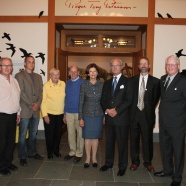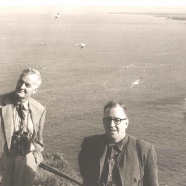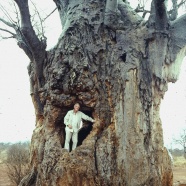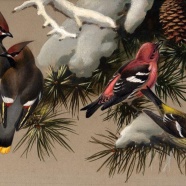Royal Visitors
In 1976, 29-year-old King Carl Gustav XVI of Sweden made a visit to America in observance of the bicentennial. He chose to visit Jamestown because of its significance in Swedish settlement in the United States, and Hessel Valley Lutheran Church in Chandler’s Valley, a village in northwestern Pennsylvania, because of the church’s significance in Swedish immigration. Hessel Valley was the mother church to many of the Lutheran congregations in the eastern United States, including First Lutheran in Jamestown, N.Y. Many Swedish Americans searching for their roots end up at Hessel Valley asking...
Read MoreSwedes of Jamestown
This photo from the RTPI archives depicts Roger Tory Peterson and Sir Lorimer Moe (knighted by the Swedish government on behalf of King Carl Gustaf XVI) at Bass Rock in Scotland. Lorimer Moe was a son of Jamestown, New York, who went on to become an outstanding newspaperman and diplomat. In the early days when RTPI was just an idea, Lorimer, Roger’s high school classmate, took the lead in enlisting broad support for the idea of an Institute in Roger’s birthplace, to honor his work and house his collections. In fact, the Institute’s charter was signed in his home, on a dining table that...
Read MoreRTP in Another Place in Another Time
Although his work required extensive travel, it seemed that Roger Tory Peterson needed the world as much as it needed him. His wife, Barbara, wrote to her mother that no matter where Roger was, he always wanted to be somewhere else. He made seven safari trips to Africa during his lifetime, shooting footage for his documentary “Wild Africa”, which contains more rare and exotic birds than any film of its time. His conservation message is powerful, and it pervades the film: “A bird like the whooping crane is more divine than the most inspired work of art. Why? Because it is creation itself;...
Read MoreFeeder Birds of Newfoundland
This plate, titled “Feeder Birds” is from the 1951 book “Birds of Newfoundland”, by Harold S. Peters and Thomas D. Burleigh of the U.S. Fish & Wildlife Service. Peters and Burleigh were commissioned by the Newfoundland government to write the book to be used as a reference in schools, as well as for citizens and tourists of Newfoundland. The book covers 227 birds, and was illustrated with 32 color plates and 40 line drawings by Roger Tory Peterson. The Newfoundland and Labrador Tourist Development Office created a series of prints from the book to sell as...
Read More







